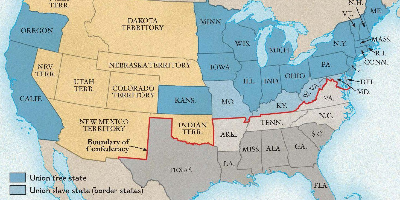Manifest Destiny (30 nov 1812 año – 1 ene 1860 año)
Descripción:
In the 19th century, manifest destiny was a widely held belief in the United States that its settlers were destined to expand across North America. There are three basic themes to manifest destiny:The special virtues of the American people and their institutions
The mission of the United States to redeem and remake the west in the image of agrarian America
An irresistible destiny to accomplish this essential duty
Historian Frederick Merk says this concept was born out of "a sense of mission to redeem the Old World by high example ... generated by the potentialities of a new earth for building a new heaven".
Historians have emphasized that "manifest destiny" was a contested concept—Democrats endorsed the idea but many prominent Americans (such as Abraham Lincoln, Ulysses S. Grant, and most Whigs) rejected it. Historian Daniel Walker Howe writes, "American imperialism did not represent an American consensus; it provoked bitter dissent within the national polity ... Whigs saw America's moral mission as one of democratic example rather than one of conquest."
Newspaper editor John O'Sullivan is generally credited with coining the term manifest destiny in 1845 to describe the essence of this mindset, which was a rhetorical tone; however, the unsigned editorial titled "Annexation" in which it first appeared was arguably written by journalist and annexation advocate Jane Cazneau. The term was used by Democrats in the 1840s to justify the war with Mexico and it was also used to divide half of Oregon with the United Kingdom. But manifest destiny always limped along because of its internal limitations and the issue of slavery, says Merk. It never became a national priority. By 1843, former U.S. President John Quincy Adams, originally a major supporter of the concept underlying manifest destiny, had changed his mind and repudiated expansionism because it meant the expansion of slavery in Texas.
Merk concluded:
From the outset Manifest Destiny—vast in program, in its sense of continentalism—was slight in support. It lacked national, sectional, or party following commensurate with its magnitude. The reason was it did not reflect the national spirit. The thesis that it embodied nationalism, found in much historical writing, is backed by little real supporting evidence.
Añadido al timeline:
fecha:
30 nov 1812 año
1 ene 1860 año
~ 47 years
